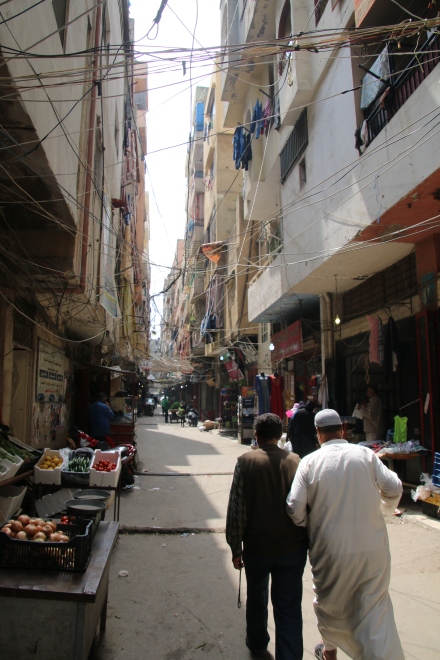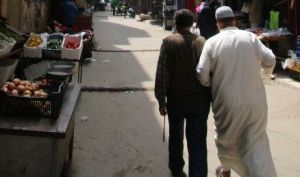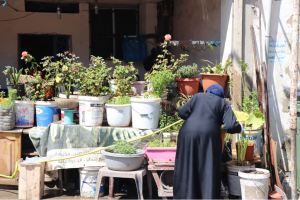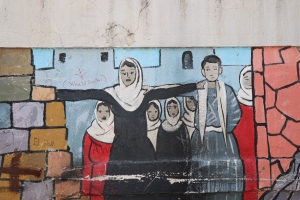On-going cycles of displacement mean that refugees are increasingly experiencing what Fiddian-Qasmiyeh refers to as ‘overlapping displacement’ in the sense that they often physically share spaces with other displaced people for long periods of time.
Although it is often assumed that refugees are ‘hosted’ by settled national populations, first responders in contexts of displacement are in fact themselves often refugees.
Refugee-led initiatives developed in response to existing and new refugee situations directly challenge widely held (although equally widely contested) assumptions that refugees are passive victims in need of care from outsiders.
By focusing on refugee-refugee humanitarianism it is possible for us to acknowledge, situate and critically examine the ways in which refugees act as active providers of support to others, rather than as aid recipients. It also enables us to reflect on the ways that refugee camps and cities become ‘shared spaces’ in which ‘new’ and ‘established’ refugees seek safety (Qasmiyeh and Fiddian-Qasmiyeh 2013; Fiddian-Qasmiyeh 2015).

By examining refugee-refugee humanitarianism (in addition to other forms of state and non-state responses to displacement), the Southern Responses to Displacement project aims to recognise and meaningfully engage with the agency of refugees in providing support and welcome to ‘new’ refugees displaced from Syria. However, through a critical analysis of the power relations that underpin refugee-refugee humanitarianism, our project aims to avoid either prematurely idealising these responses as egalitarian and empowering processes, or demonising them through securitisation frameworks. (Fiddian-Qasmiyeh 2011, 2013, 2015a).
This is especially important since refugee-led responses to displacement from Syria are taking place in ongoing situations of precarity and violence in neighbouring countries. This raises questions including: How feasible are refugee-led responses in conditions of poverty and exclusion, and who benefits and who looses out when refugees act as providers of assistance and protection for other refugees?
Recommended reading on Refugee-Refugee Humanitarianism and Refugee-Host Hospitality:
In the context of South-South cooperation in displacement situations, scholars have largely focused on the social encounter between local and refugee populations, as well as between longstanding and recent refugees, in terms of “hospitality”. Hospitality has therefore been discussed in crisis-affected settings, on the one hand, as a one-to-one or group-to-group assistance provision and solidarity networks; on the other, as a macro-political practice of order-making, political accountability, and state-building.
Carpi, E. and Şenoğuz, P. H. (forthcoming) “Refugee Hospitality in Lebanon and Turkey. On Making the ‘Other’”, International Migration.
Carpi, E. (2016) “Refugee Hospitality and Humanitarian Action in Northern Lebanon: between Social Order and Trans-border History”, Urgence, Réhabilitation, et Dévelopemment, Paris: URD Groupe.
El-Abed, O. (2014) “The Discourse of Guesthood: Forced Migrants in Jordan”, in Fábos, A. and Isotalo, R. (eds.) Managing Muslim Mobilities. London: Palgrave McMillan, pp. 81-100.
Fiddian-Qasmiyeh, E. (2016) ‘Refugee-Refugee Relations in Contexts of Overlapping Displacement,’ International Journal of Urban and Regional Research, Spotlight On “The Urban Refugee ‘Crisis'”
Fiddian-Qasmiyeh, E. (2016) ‘Refugees hosting refugees,’ Forced Migration Review, September 2016
Fiddian-Qasmiyeh, E. (2016) ‘Repressentations of Displacement in the Middle East,’ Public Culture, 28(3): 457-473, doi:10.1215/08992363-3511586.
Fiddian-Qasmiyeh, E. (2015) ‘Refugees helping refugees: how a Palestinian refugee camp in Lebanon is welcoming Syrians,’ The Conversation, 4 November 2015.
Fiddian-Qasmiyeh, E. and Qasmiyeh, Y.M. (2017) ‘Refugee-Refugee Solidarity in Death and Dying,’ 2017 Venice Bienalle Tunisian Pavillion: The Absence of Paths, May 2017.
Nazir, B. (2008) Ottoman Hospitality and its Impact on Europe. Istanbul: Istanbul Chamber of Commerce.
Ramadan, A. (2006) “The Guests’ Guests: Palestinian Refugees, Lebanese Civilians, and the War of 2006”, Antipode 40 (4): 658–677.
Rosello, M. (2002) Postcolonial Hospitality. Stanford: CA: Stanford University Press.
Rozakou, K. (2012) “The Biopolitics of Hospitality in Greece. Humanitarianism and the Management of Refugees”, American Ethnologist, 39 (3): 562- 577.
Shryock, A. (2004) “The New Jordanian Hospitality: House, Host, and Guest in the Culture of Public Display”, Society for Comparative Study of Society and History, 46 (10): 35-62.
To learn more about local community experiences of displacement from Syria, specifically with views from Lebanon, Jordan and Turkey, please also visit the Refugee Hosts website.
Featured Photo: A mural outside a school in Baddawi camp, N. Lebanon (c) E. Fiddian-Qasmiyeh, 2017



